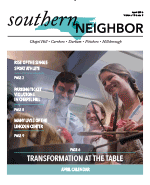Durham’s Craft Beer Boom: The Rippling Effects
When I ask Sean Wilson, owner of Fullsteam Brewery in Durham, what his favorite beer is, he replies nonchalantly, “The one in my hand.”
“Which is that?” I ask, eyeing a dark brown ale he calls Lindera.
“Oh, just whatever is in my hand at the time,” he replies.
When it comes to his brewery, Wilson takes things more seriously. Over the drum of rain on the metal roof of the warehouse-turned-brewery, he explains his vision of transforming what he calls “post-tobacco North Carolina.”
“It’s the whole mission of doing the Southern beer economy,” he said. “When we buy local from foragers and agricultural entrepreneurs, we’re building wealth and opportunity.”
Take for example his favorite, the Lindera. It’s part of the “Forager” series, seasonal brews inspired by ingredients harvested by locals in the community. A friend’s donation of a 120-pound bag of Candy Roaster squash inspired this particular beer.
“So I made a beer from this heirloom squash varietal and spice bush and North Carolina molasses,” he said, “It’s actually going next week to the James Beard House.”
The James Beard Foundation is a culinary arts nonprofit that gives out awards every year for cuisine, culinary education and culinary writing. “It’s like the Oscars of the food awards,” Wilson explained.
Especially in the past few years, craft breweries in North Carolina have surged in popularity. In 2015 there were 161 statewide, up from 101 the year before. There are now six in the Bull City, with two more planning to open this summer — and their impact expands beyond the breweries’ doors. Breweries have boded well for at least two other types of emerging businesses in Durham: food trucks and bottle shops.
Beer and food trucks
Every day a different food truck is scheduled to park outside Fullsteam, offering fare ranging from gourmet grilled cheese by American Meltdown to seafood by Oak City Fish and Chips.
The steady business Fullsteam attracts is the reason that Brennan Horton, owner of Oak City Fish and Chips, chooses to park his food truck near Fullsteam.
“When it comes to the breweries, it’s a very organic relationship,” Horton said.
Other than customers, Horton said that seating and alcohol are the two biggest benefits food trucks receive when they partner with a local brewery — because North Carolina laws will not allow a food truck to provide either.
While Horton estimates his revenue would be about 15 percent higher if he
were permitted to sell beer himself, he recognizes the benefits of pairing with a brewery in terms of enabling customers to “have the beverage of their choice beside them when they eat a delicious meal.”
The relationship is symbiotic: The food trucks also draw crowds to Fullsteam during lunch and dinner, times that are normally slow for a business that doesn’t serve food, Wilson said.
“The hope is that if people have a slice of pizza, they’re going to stick around and have a beer or have an extra beer or half pint or whatever,” Wilson said. “It gives people a reason to come visit us beyond us just offering beer.”
Beer and bottle shops
Bottle shops such as Bull Craft Bottle Shop are also among the businesses that have benefitted from the rise of local breweries.
The store sells bottles from Durham breweries and carries beer on draft to fill growlers. Other than Fullsteam, which is one of their top sellers, the shop has also sold Triangle Brewing, Ponysaurus and Bull City Ciderworks.
Bull Craft opened last August, and Stephen Medders, co-owner of the bottle shop, said much of that had to do with the recent surge in popularity of Durham’s craft breweries. He said this is particularly true in what he calls the “So-Du corner” of downtown Durham, a hotbed of local beer activity.
“Just in this little area we’ve got five bottle shops,” Medders said. “And there’s a new brewery opening up right across the street from us called Hope Valley Brewing Company.”
“Since my business is only North Carolina beers, I rely on only local businesses — if you consider all of North Carolina local,” Medders said.
“Soft factors”
Ted Conner is the vice president of economic development and community sustainability at the Durham Chamber of Commerce. He believes the greatest economic value that craft breweries bring to Durham are the “soft factors” that make the city a more desirable place to live, which in turn attracts businesses and the highly paid, creative workforce they often employ.
“Everybody wants to share in these, what I call, ‘quality life benefits’ that are accruing to our community,” Conner said. “It has allowed us to become the foodiest town in the South. And then that attracts other interests, and now we’ve got software programming firms coming in.”
But despite the benefits of attracting profitable businesses, Conner also stressed the importance of a financially diverse, sustainable and independent Durham.
“When the tobacco industry left, we fortunately had (Research Triangle Park) to sustain us, and we’ve gone through a couple evolutions of our economy since the tobacco left,” Conner said. “You need to be able to grow all elements of your economy and not become overly reliant upon software programming or life science.”
Breweries like Fullsteam are helping make that diversification happen.
Hanging behind Wilson on the wall are rows of custom plaques bearing portraits of customers who helped fund the completion of Fullsteam when money was running short. The space is open and has a relaxed vibe, and it somehow feels right that the seats at the bright orange cafeteria-style tables are slightly too close to politely ignore a neighbor.
Just outside this metal-roofed-brewery, Oak City Fish and Chips will later pull up, ready to dole out lunch to accompany a pint of craft beer.

